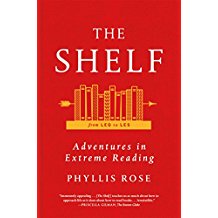The Shelf From LEQ to LES: Adventures in Extreme Reading, Phyllis Rose, 2014
Reviewed in the NYT Sunday Review with a wonderful book art illustration and reference to five books on ‘extreme reading’ which I had already read, I was primed for this book and found it mixed but finally very rewarding. Working in the New York Society Library, a private lending library in NYC, Rose embarks on a quixotic quest to ‘save’, rediscover, ‘salvage’, etc a shelf full of books that had laid fallow for some time. Choosing a shelf where there were multiple books by multiple authors (no more than five by one author) a mix of contemporary and older books, and one ’classic’ that she had wanted to read, and excluding any author she knew, off she went beginning with William LeQueux to John Lescroart by way of Rhoda Lerman, Mikhail Lermontov, Lisa Lerner, Alexander Lernet-Holenia, Etienne Leroux, Gaston Leroux, James LeRossignol, Margaret Leroy and Alain-Rene Le Sage. While some of the plot summaries were unavoidably dull, Rose’s commentary and her Internet based investigative work were wonderful. She finds the man who reviewed the South African LeQueux’s book in 1969 and moves on to a YouTube of LeQueux’s funeral. She’s left with philosophical musings on how books come and go, are forgotten or live on. Writing for fame and eternity is a fraught goal! Her reading of Lermontov’s A Hero of Our Time, the classic with its hero Pechorin perhaps the first example of the classic period of Russian literature, led to multiple translations and an extensive commentary on Nabokov and his translations which invoked Pale Fire and was wonderful. It also led her to the designer of the most recent translation and its cover photo of a contemporary hip Pechorin—she liked it but found that the designer hadn’t even read the book! LeRoux’s Phantom of the Opera led to musings on books vs more popular entertainment like the Lon Chaney silent film and the Broadway smash and the concept of literary evolution in which one work is treated differently in different times. Rhoda Lerman, Lisa Lerner, and Margaret LeRoy led to a long exposition of the ongoing difficulty of women writers to achieve parity and recognition. Not surprisingly Rose becomes friends with all these women! Virginia Woolf, Jonathan Franzen, Grace Paley, Jodi Picoult—all figure in this analysis which is brilliant. Lernet-Holenia’s short stories in Austrian leads to a discursive discussion about Austrian Jews and WWII, Klimt, and regional authors (she slams Naipaul) like LeRossignol who writes about Canada though he ended up a professor in Nebraska. What follows is a discussion about libraries and how they make room: CREW or Continuous Review Evaluation and Weeding based on MUSTIE, Misleading, Ugly, Superseded, Trivial, Irrelevant, and Elsewhere. Also circulation matters with 2 years the apparently critical time. She then moves on to Nicholson Baker and to Proust, whose famous novel was rejected by three publishers including Andre Gide. Samuel Johnson’s Common Reader (“I rejoice to concur with the common reader; for by the common sense of readers, uncorrupted by literary prejudices, after all the refinements of subtility and the dogmatism of learning, must be finally decided all claim to poetical honours.”) is the basis for her embrace of Amazons’ reviewers and crowd sourcing based originally on Francis Galton’s experiment with guessing the weight of an ox in 1906. The role of the academic curriculum in establishing a ‘classic’ is discussed as are Nabokov’s preferences (Kafka, Joyce, Proust, Flaubert) and Wilson’s English choices (Austen and Dickens). Rose discusses book reviewers (midwives; one time event, worth your time) and literary critics (pediatricians, life long relationship, “by talking about a book over and over, through the years and centuries, we help to nudge it into eternal life. If we go on reading it, it is worthy to be read, proving itself to be not of an age, but for all time.”) She then moves on to discuss detective fiction (“if you don’t like the characters and there isn’t a compelling narrative”, forget about it), public libraries (Johnson again, “No place affords a more striking conviction of the vanity of human hopes, than a public library”), Geoff Dyer, Shackleton, and the difference between the ‘guided tour or reading’ and the random walk induced by library’s open shelves. Rose finishes this delightful tour of a shelf with an italicized list of her favorite authors and works, much too long to summarize or even count! Amazing how much overlap there is with my reading—



